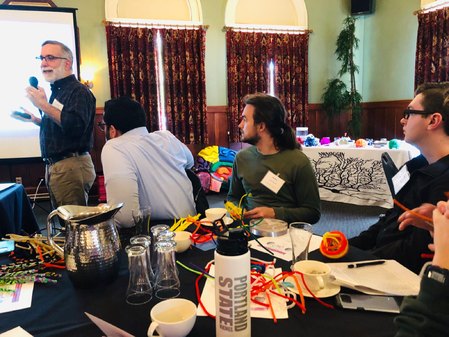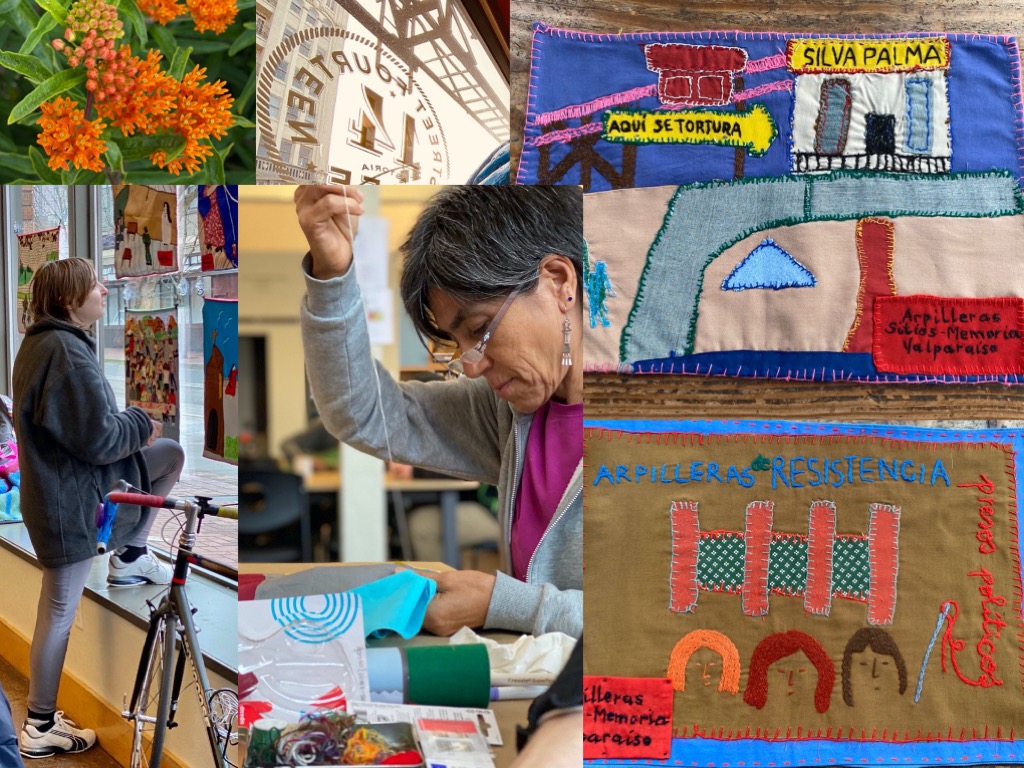
- This event has passed.
Society for Neuroscience Oregon / SWWA Annual Meeting
April 15, 2021 @ 8:50 am - 7:30 pm
WHAT: Society for Neuroscience Oregon / SW Washington Annual Meeting
A fantastic celebration of regional scientific research!

CHECK OUT THE PROGRAM: SFN OR-WA 2021 program
WHERE: Register for the *ONLINE* Chapter Meeting HERE
WHEN: Thursday, April 15, 8:50am – 7:30pm
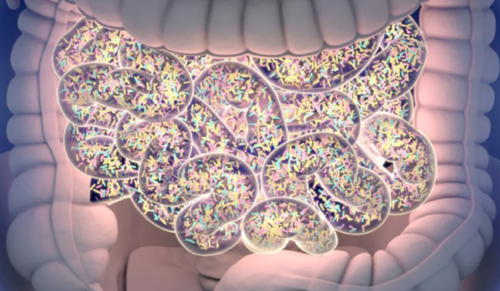
The Oregon/Southwest Washington Chapter is the local group affiliated with the Society for Neuroscience. Our annual meeting in the spring brings together neuroscience students, postdoctoral scholars and faculty from across the state and region to share projects and network with colleagues.
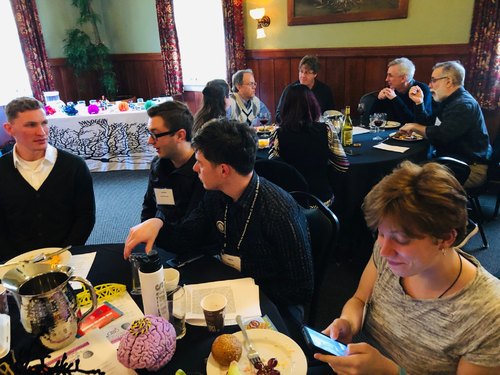
Noggin poster
NW Noggin: Axons & Arpilleras – Addressing trauma and supporting community across disciplines and national boundaries
GRIESAR, W.S.* ** *** ****, LEAKE, J.* ** *** ARANEDA, C. ** *****
“No happiness or pain, no more forgetting”

Science needs investment and diverse perspectives. Integrating arts in STEM (STEAM) encourages more people to get involved.
Nonprofit NW Noggin (nwnoggin.org) organizes undergraduates and graduates to collaborate, build community networks and inspire people about neuroscience and art. Volunteers benefit from work across disciplines and institutions, serve as “near peer” role models, gain skill explaining research, and think creatively about careers. We’ve met over 45,000 academic priority K-12 students, homeless youth, incarcerated youth and members of the public since 2012!

Extreme inequality defines the United States, with devastating brain, health and social consequences, as more people struggle to access food, water, education, public transit, healthcare and housing.
Concentrated wealth isolates those with extravagant resources from the broader community. Isolation is worsened by degrading rhetoric from political leaders and pundits who protect privileges, often by dehumanizing others.
Inequality can also lead to the violation of human rights, and violence.
Valparaíso, Chile, home to both a long history of neuroscience research and astonishing art traditions, is currently targeted by a repressive and authoritarian government, whose leader, billionaire Sebastian Piñera, has declared “war” (guerra) on those protesting injustice.
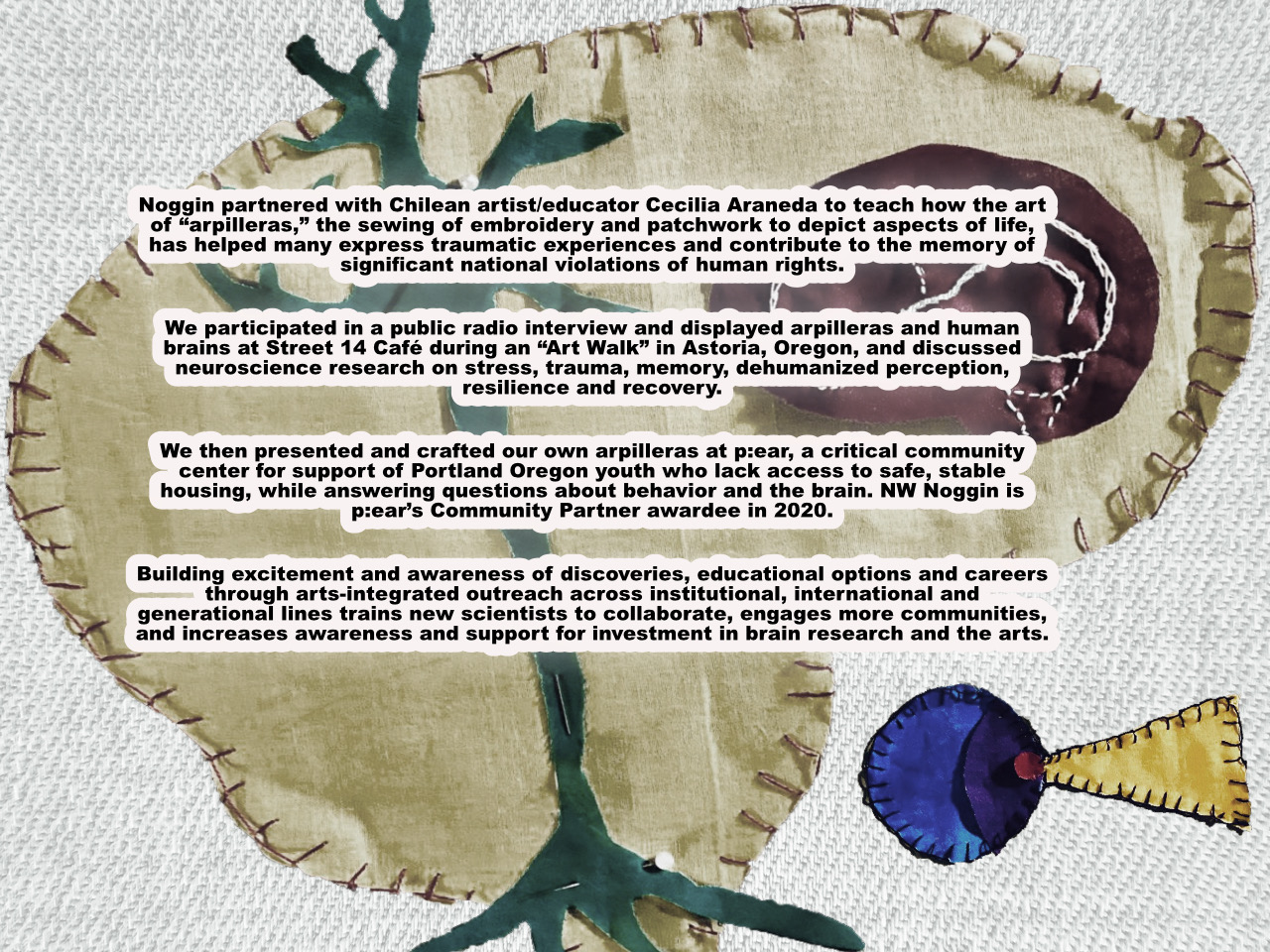
Noggin partnered with Chilean artist/educator Cecilia Araneda to teach how the art of “arpilleras,” the sewing of embroidery and patchwork to depict aspects of life, has helped many express traumatic experiences and contribute to the memory of significant national violations of human rights.
We participated in a public radio interview and displayed arpilleras and human brains at Street 14 Café during an “Art Walk” in Astoria, Oregon, and discussed neuroscience research on stress, trauma, memory, dehumanized perception, resilience and recovery.
We then presented and crafted our own arpilleras at p:ear, a critical community center for support of Portland Oregon youth who lack access to safe, stable housing, while answering questions about behavior and the brain. NW Noggin was p:ear’s Community Partner awardee in 2020.
Building excitement and awareness of discoveries, educational options and careers through arts-integrated outreach across institutional, international and generational lines trains new scientists to collaborate, engages more communities, and increases awareness and support for investment in brain research and the arts.
* Department of Psychology, Portland State University; ** NW Noggin (nwnoggin.org); *** Department of University Studies, Portland State University; **** Department of Behavioral Neuroscience, Oregon Health & Science University; ***** Colectivo Memoarte
Sewing Memories, & Brains
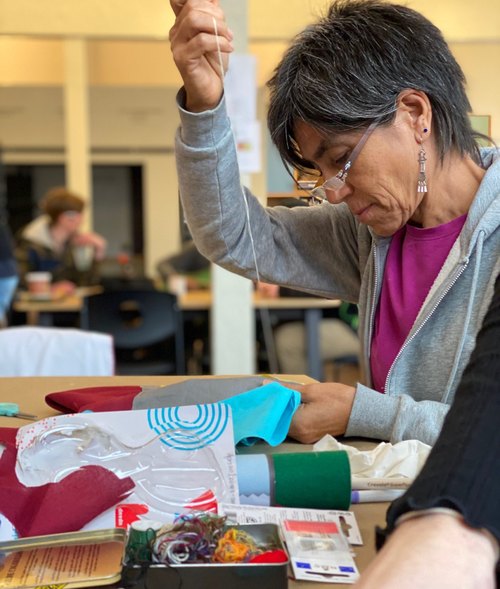
PSU Neuroscience Club poster
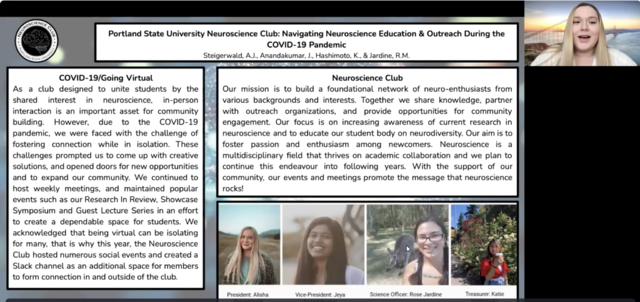
WATCH HERE: Navigating neuroscience education and outreach during COVID-19
See what our outreach participants have done with SfN in the past!
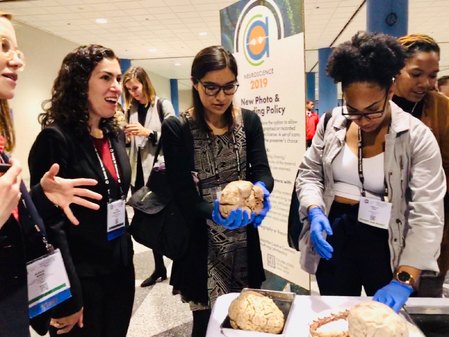
LEARN MORE: Noggin @ Society for Neuroscience
2021 Chapter Program
8:50 AM Welcome
Mini-symposium of the Gut Microbiome-Nervous System Axis
9:00 Insights into the enteric nervous system: perspectives from a gut stem cell biologist
Annie Zemper, Ph.D., Assistant Professor of Biology, University of Oregon
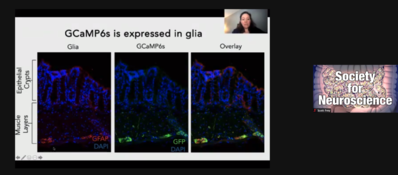
9:30 Environmental challenges, the gut microbiome, and behavioral and cognitive measures in mouse models
Jacob Raber, Ph.D., Professor of Behavioral Neuroscience, OHSU
10:00 Microbial modulation of zebrafish behavior and brain development
Judith Eisen, Ph.D., Professor of Biology, University of Oregon
10:30 Emerging roles of gut microbiome in autism
Maude David, Ph.D., Assistant Professor of Microbiology, Oregon State University
11:00 Role of the Gut Microbiome in Effects of Dominant Human Amyloid Precursor Protein (APP) Mutations on Behavioral and Cognitive Performance in Mice
Payel Kundu, Ph.D., OHSU

11:15 Lunch break and poster viewing
12:30 An eye on neurogenesis: Exploring how retinal progenitors transition from proliferation to differentiation in the developing zebrafish visual system
Kara Cerveny, Ph.D., Professor of Biology, Reed College
1:00 Comparing Response Times Between HSAN2 and Typical Participants
Chris Koch, Ph.D., George Fox University
1:15 A Non-Human Primate Model of Neonatal Encephalopathy to Evaluate Novel Translational Therapeutics
Meredith Kelleher, Ph.D., Oregon National Primate Research Center
1:30 Brain Volumetrics Across the Lifespan of the Rhesus Macaque
Steven Dash, Oregon National Primate Research Center
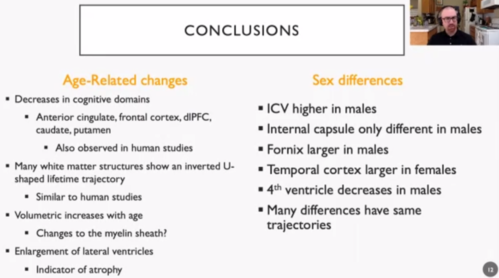
1:45 Centella asiatica and Withania somnifera improve resilience in a Drosophila melanogaster model of aging
Christine McClure, N.D., M.S., OHSU

2:00 Cannabidiol Vapor Inhalation Effects in Memory, Social Interaction, and Instrumental Behavior of Female Rats
Maria Rivera-Garcia, Ph.D., Dow Neurobiology Labs – Legacy Research Institute

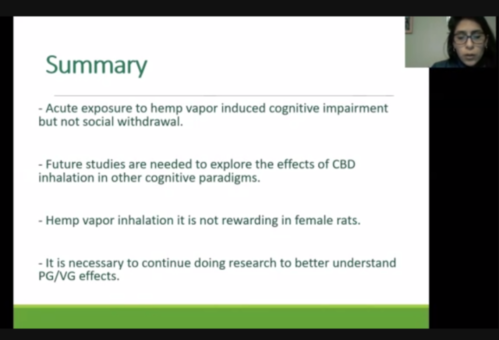
2:15 Break and poster-viewing
2:45 Understanding functional architecture and neuromodulation of brain circuits using connectomic and novel imaging approaches
Tianyi Mao, Ph.D., Associate Professor, Vollum Institute, OHSU
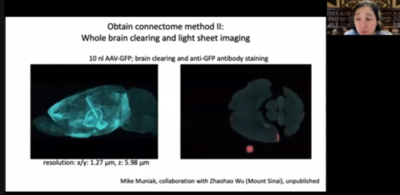
3:15 Investigating the Role of Cell Migration Inducing and Hyaluronan Binding Protein (CEMIP) in Central Nervous System Disease
Alec Peters, Oregon National Primate Research Center

3:30 Expression and Distribution of Aquaporin-1 in Extremely Aged Rhesus Brain
Opal Stayer-Wilburn, Oregon National Primate Research Center
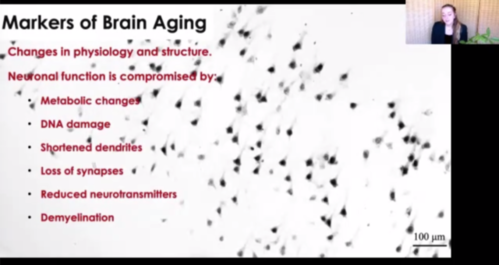
3:45 Ibuprofen induces differences in NMDA and AMPA receptor functions between males and females
Emily Sackinger, Oregon State University
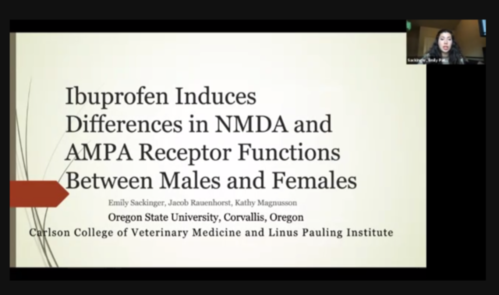
4:00 Amyloidosis in the Prefrontal Cortex of Old Rhesus Macaques Resembles that of Humans, Showing Extracelluar Plaques and Cerebral Amyloid Angiopathy
Gail Stonebarger, Oregon National Primate Research Center
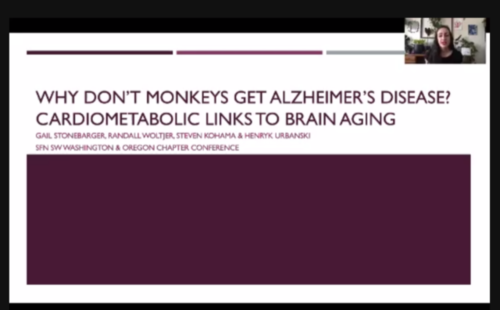
POSTER SESSION Q&A
4:20 John Cook
4:25 Raey Gesese
4:30 Bill Griesar and Jeff Leake (video above)
4:35 Alex Speers
4:40 Abby H. Gligor
4:45 Forrest Fearington
4:50 Angela Gonzalez
4:55 Jonathan Anguiano
5:00 Mikah Brandes
5:05 Mae Rose
5:10 AJ Mitchell
5:15 Sarah Holden
5:20 Tua’au Laolagi
5:25 Alisha Steigerwald, PSU Neuro Club (video above)

5:30 Matthew R. Blake
5:35 Geoffrey A. Dunn
5:40 Karli Corey
5:45 Sree Yeturu
5:50 Teagan James
5:55 Noa Rayzman
6:15 KEYNOTE: How genes and bacteria shape the risk of neuroinflammatory disease: The example of Multiple Sclerosis
Sergio Baranzini, Ph.D., Professor of Neurology, UCSF Weill Institute for Neurosciences
7:15 Awards and closing
